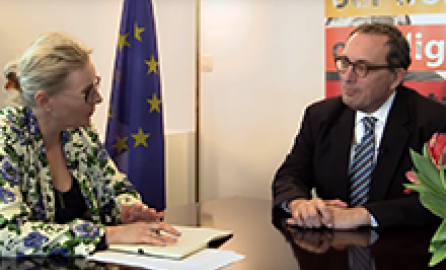On Tuesday, the European Commission’s Directorate General for International Cooperation and Development (DG DEVCO) welcomed back Stefano Manservisi as its new Director-General. He spoke to Stina Soewarta, DEVCO’s Head of Communication and Transparency, about his visions for DEVCO and the challenges that the DG is currently facing.
| Stefano Manservisi joined the European Commission in 1983, joining DG VIII (later to become DG DEVCO) four years later. From November 2004 to July 2010 he worked as Director-General of DG Development and Relations with Africa, Caribbean, Pacific States. He then served as Director-General for Home Affairs for four years. In 2014 he became Head of the EU Delegation to Turkey, but soon returned to Brussels to serve as the Head of Cabinet for the High Representative/Vice President Federica Mogherini, where he remained until now. |
Stina Soewarta (SS): Welcome Stefano Manservisi, our new DG on your first day in the job. Is it fair to say that you are coming back to development after some years away, or would you rather say that throughout your career you have been working on development policy in some form or another?
Stefano Manservisi (SM): Well it’s coming back, but I’m coming back enriched, in the sense that throughout my career I’ve been working for development. And as someone once said, it’s a business which is very close to a passion. Therefore it’s difficult not to consider development as something major, enriching people and allowing us to do, and to think of important things to do for people. So yes it’s a coming back from this passion point of view, but it’s a coming back which is different.
Because in the meantime I’ve learned a lot of things. I’ve had other experiences, and I hope that I’ll be able to bring these new – perhaps richer – dimensions, into this important work. [As Head of Delegation] I saw this in practice every day in Turkey, which is not a developing country, but still has a lot of commonalities for work. And in other areas seen more from the foreign policy side. Therefore, I hope that I can be useful in renovating and reforming development policy.
SS: What is your vision for DG DEVCO? With all the challenges that are currently emerging around the globe, how can DEVCO contribute to overcoming these?
SM: Well I think that DEVCO is the central DG in President Juncker’s architecture that he set up at the beginning of this Commission.
This is not a ‘business as usual’ moment; it is not a ‘business as usual’ Commission. You have seen the President’s ten-point project, you have seen the way in which the Commission has been organised: ten projects with ten project teams. One concerns Europe in the World and this comes under the HR/VP [High Representative Vice President of the Commission], and the two hats to which I hope I contributed when I worked with Frederica Mogherini. Now DG DEVCO is the central machine. Not only for spending, but also for defining policies which are implemented worldwide. Therefore I think that the first point is to anchor DEVCO at the centre of this project, at the centre of this group.
There are still sometimes tendencies in the world of development to be separate. I think the first piece that we would like to bring is to further contribute to putting DEVCO at the centre of this. Second I think that today development and international cooperation, because these are the two main axes of activities of the DG, within the framework of one project to make the European Union stronger, more resilient, and able to respond to the people’s – and European Citizens’ – expectations.
There is a lot of criticism of the European Union, some of it is well motivated, but all criticism is underlined by one thing: that people today expect more from Europe, not less. When people say you know Europe is marginalised, no just listen to people in the street. And every person critical or not wants to receive more from Europe.
Therefore the development of international cooperation means to respond to these expectations, which are for more security, more fair growth, a more sustainable world, more and better management of international mobility; I prefer to use this to migration, because in a global world people want to move. Therefore we have to structurally deal with mobility.
So today’s international cooperation and development policy should be measured in dealing with these challenges, which are at the very heart of citizens’ concerns and expectations.
I will work in order to use my experience and the instruments available in DG DEVCO for this purpose.
SS: In your opinion what will be the challenges for DEVCO colleagues (both in headquarters and in delegations) in achieving this? How do we continue to work in a changing world, and also work well with others?
SM: I would say we need to be creative; to make proposals; to take risks; to work in a team. Not to think in isolation, but to think global. We need to be aware of the fact that whatever contribution is requested is not just a contribution to implement a policy, but a contribution to make the European Union institutional architecture stronger and more efficient.
This is true from the furthest delegation, to here in headquarters. We need to work with colleagues in other DGs and to work differently with our Member States. The time of the competition between EU Institutions and Member States is over; by the way it never existed. In reality it is a question of working together. What was done, for example, following the Busan agenda on Joint Programming is not just an agenda to do it better in a generic way. It’s an agenda to build a stronger Europe and this is not feasible without strong cooperation between Member States. In turn Member States should understand that the aim is not to give more space to the Institutions at the detriment of Member States, but rather to contribute from both sides to build a stronger Europe.
|
In the following video, Stefano Manservisi examines the question of whether we can keep European citizens engaged in development. He discusses the issues of migration and security, sharing examples of dealing with these issues in his previous roles as Director-General for both Development and Home Affairs.
|
SS: This interlinkage that you’re speaking about, does it also then apply for the Sustainable Development Goals (SDGs)?
SM: Absolutely. I was among those in 2005 who contributed to writing the consensus; the EU consensus for development. And I also took part in the millennium assembly which set up the MDGs [Millennium Development Goals]. Therefore I witnessed the moment in which the international community, with a big effort, decided to rationalise development to identify eight goals. They placed the money from the financing for development agenda behind this and created an agenda of aid effectiveness in order to have these three pillars. But these pillars were very much there to do better for the developing countries, in particular the poorest.
From that moment up until now there have been a lot of changes. First the profile of developing countries is not the same. The poverty is still there, but the profile of these countries is different. The number of graduated countries, the number of middle-income countries, the number of countries which have to ask themselves whether they are properly using their own resources to fight against existing poverty, these have all changed.
The world has become more global. We have been going through a tremendous economic crisis, probably the biggest since the creation of the free market. This has changed a lot: us, development, the developing countries, it has changed let’s say the parameters. And this has been translated into the SDGs and the 2030 Agenda.
The SDGs are a fundamental change, because what we are saying is that in fact development is not ‘we do for you’, but ‘we are doing it for everyone’. We are building a world which is more resilient and more sustainable for all. I always said that investing in development is not investing in charity, it is investing in our own future.
Now all of this is encapsulated even better in the SDGs, because the SDGs are the representation of the fact that not only money matters, but the right policy mix for everyone.
It’s an even more evident sign of the fact that when we think about development we have to think about our communalities; therefore this is a powerful shift. We need to adjust our tools and our policies. Why? Because by the end of the year we have to reform our consensus and put it in tune with the SDGs and the 2030 Agenda.
We have to make it more coherent, not only with sectorial policies, but with all of our policies. The internal side of the 2030 Agenda in the SDGs is the reform of the European Semesters after all. Therefore we have to progressively use our tools and our thinking in order to represent how we are developing in the European Union, and how we can contribute – with a good mix of policies and money – to the improvement of the developing world.
SS: When you speak about these topics, we can clearly see your passion. And this is a passion, I believe, that is shared by colleagues in-house and in delegation. Do you have an anecdote, or story that you could share with us that demonstrates this?
SM: An anecdote would be difficult, but I can share with you what’s happened to me today. It’s been lovely to receive, on my first day as DG, messages from people that I haven’t seen in years. These are people that I barely knew. For example civil society representatives from the depths of Africa that I met once; people that I travelled with or took part in conferences with; they said to me we met, we had fun together, we ate together, we reflected together without any formality, and we’re very happy to see you come back to development.
So it’s not an anecdote as such, but I would like to say that since I’ve received so many of these messages, I’ve thought to myself: maybe it’s not just the capacity – that incidentally we will see – of managing a complex organisation. Maybe it’s also the personal engagement. And I think that to build a European presence in development without personal engagement, and without passion is not possible.
|
Further Reading in the Public Group on Development Policy
|


Log in with your EU Login account to post or comment on the platform.